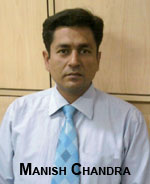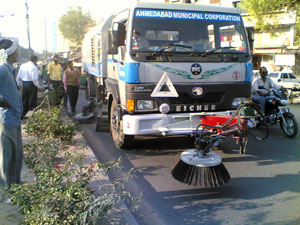Sweeping in India

Sweeping in India |
 |
An Overview of Sweeping in Indiaby Manish Chandra and Ranger Kidwell-Ross
Manish Chandra is the Business Development Manager, Infrastructure, for Eureka Forbes Limited. Eureka Forbes represents Bucher Schoerling road sweeping machines through its more than 180 offices located throughout India.
In the following interview, Mr. Chandra provides an overview of how sweeping is done in India, both currently and historically. He also provided the photos that accompany the article.
WORLDSWEEPER: Would you start by providing readers with an overview of the Indian sweeping marketplace at the start of 2010? 
Whenever a vacuum road sweeping machine operates on the road dust clouds are formed. If water is sprayed on the side brushes to tame the dust cloud, these filters get clogged up frequently. Then, suction drops. It has been seen recently that the end-users are slowly shifting toward imported and good quality road sweeping machines without any bag/cartridge filters. However, these machines use a lot of good quality water for taming the dust cloud and availability of drinking water is always a problem in Indian cities. Surprisingly, neighbouring countries of India have realized the reason behind the under-performance of poorly designed sweeping machines and they have large numbers of good quality and imported, properly-designed, sweeping machines on their roads. Indian road sweeping industry is still in early stage as the performance of the indigenous road sweeping machines have created an impression that road sweeping machines are not suitable for the somewhat unique challenges of Indian roads.
WORLDSWEEPER: Are there sweeping contractors in India or is sweeping all done by governments? Presently road sweeping is done by contractors in major metro cities (Mumbai, Delhi, and Kolkata) except Chennai where the municipal corporation has procured the sweeping machines and they themselves sweep the roads.
WORLDSWEEPER: What government agencies do sweeping?
WORLDSWEEPER: Can you speak more about lack of water for using in sweepers?
WORLDSWEEPER: Are there any kinds of mandates re: clean air or clean water in India's cities, states or federal government? The government works through the 'Ministry of Urban Development,' 'urban local bodies,' and 'municipal authorities' for implementing the guidelines of MSW-2000. In India you will find all the guidelines for clean water, clean roads, etc., but these guidelines are never implemented fully.
WORLDSWEEPER: Are sweepers seen as a way to attain positive water quality results?
WORLDSWEEPER: What countries in that sector of the world seem ahead in terms of keeping their streets cleaned environmentally, thoroughly, etc.?
WORLDSWEEPER: Is there anything that might be unusual or different during sweeping in India?
WORLDSWEEPER: Is there still an active 'humans sweeping with brooms' industry?
WORLDSWEEPER: What percentage of total pavement, or pavement in the average city of 100,000 or more, would you estimate gets swept once a month? More/less?
I hope this information gives those in the sweeping industry in other countries around the world a better idea of the sweeping industry in India. You can contact Manish Chandra, Business Development Manager, Infrastructure, for Eureka Forbes Limited via email sent to: manish.chandra@eurekaforbes.com. The Eureka Forbes website is www.eurekaforbes.com.
|